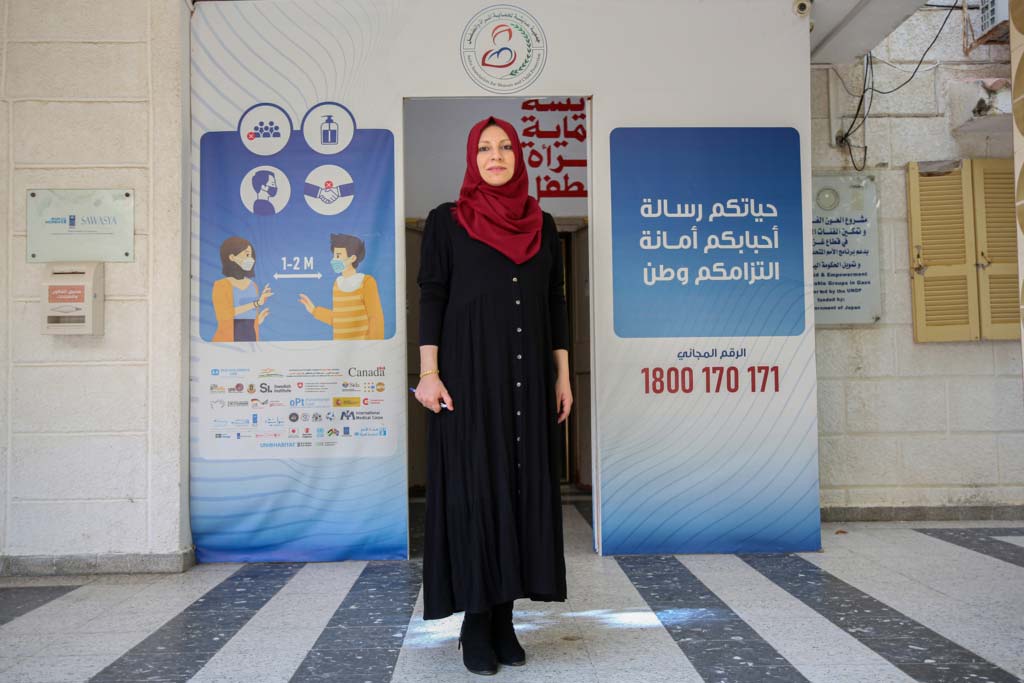Defending women’s rights in the midst of war
In Gaza, war is your constant companion. For women human rights defender Mariam Abu Alatta, the latest escalation meant personal loss and tragedy—but also great courage in her work.

The attacks started on May 10th, during the last two days of Ramadan. Mariam and her family were in the middle of making cookies, preparing for Eid al-Fitr (the breaking of the fast), when she received the news of her cousin’s death.
“He was 30 years old and has three kids. It was a shock for us,” she recalls.
In the beginning, Mariam thought the attacks would only last a few days. This wasn’t the first time, after all, that she had experienced aggressions over Gaza. But this time, the bombing didn’t stop after two or three days. Instead, it evolved into the most violent conflict the area had seen in several years.
Fleeing their home
On the second day of the bombing, at 11pm, a loud noise in the street prompted Mariam to open the door—only to find her entire neighbourhood moving towards the west side of the Gaza strip.
“This neighbourhood had been destroyed in past attacks, but I didn’t want to leave,” Mariam recalls. “Until my husband and I realised that staying by ourselves would be too hard.”
They decided to make their way to Mariam’s family’s house on the west side.
“Once I got there, I found that my whole family was displaced. Then an airstrike began very close to us. The doors and the windows were open and dust came in. We were like 20-30 women and children staying in the same kitchen. A small kitchen. It was a really terrible night,” says Mariam.
When she stepped outside in the morning, the street that Mariam had passed the previous night was destroyed. “I couldn’t imagine what would have happened and how many losses there would have been, if we had arrived just ten minutes later,” says Mariam.
Stepping up in times of crisis
In her day job, Mariam works at a women’s rights organisation called Aisha Association for Woman and Child Protection—one of Kvinna till Kvinna’s partner organisations in Gaza. In crises like these, women are usually more affected and Mariam and her colleagues felt they had to step up.
“We found ourselves un-safe, not protected and all the plans done to secure the humanitarian work were not functioning,” she says.
When the attacks were still on-going, the staff at Aisha started distributing non-food items like pillows and mats to displaced people—risking their own safety. The organisation’s core focus is supporting women who face gender-based violence. With shelters and official institutions closed, vulnerable women had nowhere to go and were confined to the home. This put many at risk, as cases of domestic violence increased and women couldn’t access basic health services.
Hopelessness and despair
Continuing their work during the attacks was difficult. “You are trying to pretend like you are not under bombing,” Mariam says. “But you can’t”.
This time, the experience of war was also different on a more personal level for Mariam. Being the mother of a two-and-a-half-year-old son had changed things. While he was shaking in her lap, covering his ears to numb the sound of the bombing, she felt a sense of hopelessness.
“I kept thinking: this time we survived, but what about the next time?”
War as a constant companion
After more than ten days of fighting, a ceasefire was declared on May 20th. Since then, women’s organisations such as Aisha have tried to pick up their regular work, while also putting additional focus on psychological support and mental health services. But it isn’t easy.
“You can’t talk about mental health and psychosocial support while people still can’t find access to health, medication or their houses are destroyed,” says Mariam.
Today, the war is a constant companion in Mariam’s conversations with friends and family: “In Gaza, we can’t sit together in the evening as a family without mentioning the war. If it’s not 2021, it’s 2014, 2012, 2008… they are all interlinked. As much as we talk about the wars, we still feel the need to talk about it even more,” she explains.
“In a way, we are always ready, but we will never be used to these escalations. We just want to be and live like humans”.
Kvinna till Kvinna has worked for women’s rights since 1993. Together with over 100 partner organisations, we work on site in areas affected by war and conflict to achieve lasting peace by strengthening women’s influence and power. We have worked in Palestine since 2001. Learn more about our work in Middle East and North Africa